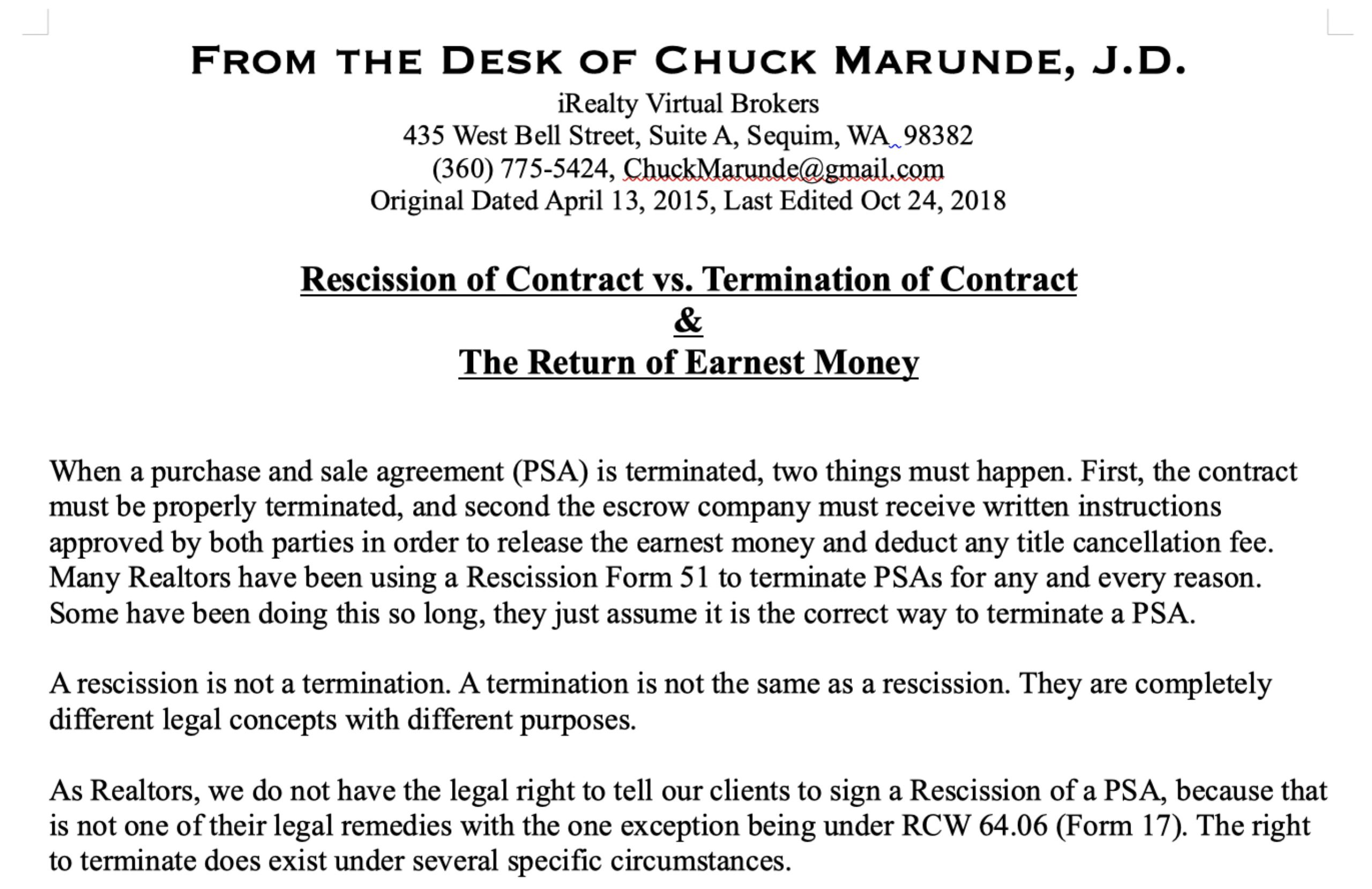If you need to terminate a real estate contract in Washington State (or for a real estate contract in Sequim WA where I am), you will want to do it right. Many real estate agents have this all wrong and use the wrong form and are not just practicing law without a license, their committing malpractice (and they’re not even real estate lawyers). Of course, you and I don’t really care what other agents are doing, but if you are going to terminate a real estate contract yourself, you do care what form is used and the process and timing, or you could get into serious legal trouble.
I’ll share the correct legal process and forms to use to terminate your Washington real estate transaction properly.
Because the vast majority of real estate agents (now called real estate brokers) in Washington state have this wrong, and certainly in Sequim WA, I am including here my reasoning, which is lengthy and detailed. If I didn’t thoroughly address the issues as I did in this legal brief (if you don’t know, I was a real estate attorney for 20 years), real estate agents would just blow this off as though I didn’t know what I was talking about. The level of arrogance on legal issues and contract language among agents is surprising to me, because many will argue with me over the meaning of a clause, and while I don’t do it, I sometimes think I should ask, “What law school did you go to, who mentored you in the finer principles of contract law, and how many decades of law practice and contract litigation do you have?” But I don’t. I diplomatically answer the questions, but in this case, you can imagine me trying to educate a Realtor on the phone, which does not work when someone on the other end is not teachable, so I wrote this detailed analysis, which I can just email the other Realtor. Whether they read it in full or comprehend it, well . . . that’s another matter, isn’t it? Are you ready? Here we go. [Note: This is written to other Realtors, so you’ll see that in the way I address my intended audience, but I want to share this in the Real Estate Universe for the benefit of Realtors and everyone.]
How to Terminate a Transaction
When a purchase and sale agreement (PSA), aka purchase agreement, aka real estate contract, is terminated, two things must happen. First, the contract must be properly terminated, aka cancel the contract, and second the escrow company must receive written instructions approved by both parties in order to release the earnest money and deduct any title cancellation fee. Many Realtors have been using a Rescission of contract Form 51 to terminate real estate contracts for any and every reason. Some have been doing this so long, they just assume it is the correct way to terminate a purchase contract. [Notice I use various titles for the same purchase agreement or PSA, because that’s how it is in the field.]

A rescission is not a termination. A termination is not the same as a rescission. They are completely different legal concepts with different purposes. As real estate agents, we do not have the legal right to tell our clients to sign a Rescission of a PSA, because that is not one of their legal remedies with the one exception being under RCW 64.06 (Form 17). The right to terminate a real estate contract does exist under several specific circumstances.
The PSA spells out exactly what our clients’ rights are when one of the parties wants to terminate or when one of the parties breaches the PSA, and rescission is not one of them. In addition, advising our clients to sign a rescission is completely outside the terms of the PSA. In other words, we as Realtors have no authority to advise them to rescind when that isn’t one of their contractual remedies. To give our clients advise to do something that is outside the contract would require that our clients seek independent legal counsel. Taking on that legal responsibility and liability is a dangerous position for a Realtor. Many Realtors assume that because they haven’t been caught up in a lawsuit, they never will. That’s like saying car accidents always happen to someone else.
Here’s why it is improper to use a Form 51 Rescission of Contract when one of the parties is terminating the contract based on a contractual provision addressing termination.
Rescission and termination are two entirely different legal concepts.
A rescission is a statement that the parties want to undo their contract as though it never existed. In other words, rescission seeks to erase all history that the contract existed and that the parties had any relationship. It eliminates all the contract rights and responsibilities. That might sound like a termination, but it is not.
In the law for hundreds of years rescission of contract was used primarily when there was fraud or duress involved on one side of a transaction. Courts in equity could grant rescission to one party only under very limited facts in a lawsuit. The other case in which parties could rescind a contract is where there was a mistake of fact, like when a buyer thought he was going to buy a yellow house on a street corner, but the seller intended to sell a different house. In such a case, it made sense to make the contract go away entirely by rescinding it. The parties had never actually had a meeting of the minds, so there was no contract.
Some might understand rescission better by comparing it to a divorce and an annulment. An annulment is like a rescission, and a court renders a ruling that the couple were never married with the legal rights and responsibilities of a married couple. On the other hand, a divorce recognizes the couple were married, that they want to terminate their relationship, but with a divorce the parties still have a host of legal rights and responsibilities that could play out depending on the circumstances. Annulments are an exemplary remedy in the law, and they are rarely granted by a judge.
Real Estate Contract Language Addresses Termination
There are several cases in which termination of a contract is specifically addressed in our standard Form 21 (PSA) and in the addendums. Here are some examples.
- The Home Inspection. When a buyer issues a Form 35R (Inspection Response) to a seller stating that he is terminating the contract, that is clearly a termination. Using a Rescission Form 51 is not appropriate and NOT authorized in the contract. The Form 35R terminates the contract under the terms of the Form 21 and the Form 35R in para I. The notice affirms the buyer’s contractual right to return of the earnest money. This notice only requires the buyer’s signature to terminate, but both parties must also sign instructions to the escrow company addressing the return of the earnest money to the buyer, and the payment of any title cancellation fee.
- The Septic Inspection. The same is true of the septic inspection. A buyer can terminate a transaction based on disapproval of the septic inspection report, but it is a termination, not a rescission. The notice affirms the buyer’s contractual right to return of the earnest money. This notice only requires the buyer’s signature to terminate, but both parties must also sign instructions to the escrow company addressing the return of the earnest money to the buyer, and the payment of any title cancellation fee.
-

Proper termination for financing failure. Financing Failure. If a buyer’s financing fails, he terminates under the terms of the Financing Addendum and gives notice with Form 90I. Like the other forms, this notice uses termination language. The notice affirms the buyer’s contractual right to return of the earnest money. This notice only requires the buyer’s signature to terminate, but both parties must also sign instructions to the escrow company addressing the return of the earnest money to the buyer, and the payment of any title cancellation fee. [NOTE: The seller is entitled to see a document or letter from the buyer’s lender that the buyer’s financing has failed and for what reason. This contingency is based on the failure of financing, not the buyer’s change of heart about how much he wants for a monthly payment or how much he is willing to pay for loan costs and fees.]
- Seller’s Disclosure. Here is the one time that we might use a rescission. A buyer can rescind a contract under the terms of the Form 17, Seller’s Disclosure Statement. This rescission is specifically called a rescission in Form 90A, Notice of Rescission of Contract Pursuant to RCW 64.06. This legal right to rescission finds its authority in state law, RCW 64.06, and the use of Form 17. Again, the buyers right to return of the earnest money is affirmed. This notice only requires the buyer’s signature to rescind, but both parties must also sign instructions to the escrow company addressing the return of the earnest money to the buyer, and the payment of any title cancellation fee.
- Disapproval of Park Rules and Regulations. This is a Form 90N, and the buyer is contractually authorized to terminate the transaction if he does not approve of the park rules and regulations in the purchase of a manufactured or mobile home in a park. This notice only requires the buyer’s signature to terminate, but both parties must also sign instructions to the escrow company addressing the return of the earnest money to the buyer, and the payment of any title cancellation fee.
- Feasibility, HO Assoc. Review, HO Insurance Unavailable, Title Disapproval, Public Offering Statement Disapproval, Resale Certificate Disapproval. There are a number of specific reasons to terminate, which must be authorized in the Form 21 or an appropriate addendum, and that means the correct notice of termination must be used, and if there is not one in the NWMLS forms, a Form 34 with precise language referencing the authority to terminate must be drafted.
- Breach of Contract. If a buyer breaches the contract, we only need to look at the contract language to see what the other party’s remedy is. For example, if the buyer does not have the funds to close on the day of closing, he has breached the contract. If closing comes and goes, the seller can say the buyer breached. The Seller can issue the statewide form for this, which is Form 90D entitled, Failure to Close, Notice of Termination by Seller—Seller to Keep Earnest Money. The right of the Seller to keep the earnest money is in the main purchase and sale agreement. To call this a rescission would be wrong. The buyer breached and the seller has the contractual right to terminate—not rescind the contract. That’s why Form 90D is called a Termination.
It is possible for a buyer and seller to both change their minds and decide to not go through with their transaction, and in such a case, they could mutually agree to rescind. But that’s not within the contract language in the PSA governing any of the standard terminations listed above. And it would be extraordinarily rare for a buyer and seller to both decide not to go through with a transaction when there were no other failures or breaches. In 40 years in real estate I’ve never seen that happen. Again, this kind of mutual rescission is not contractually authorized when there is a specific provision addressing termination. There is normally a specific reason a contract is to be terminated, and it is almost always because the buyer decides to terminate under one of their options.
Terminate a Contract
I have seen a rescission of a purchase agreement as the result of litigation that lasted two years, but that involved a host of unique facts and complex legal issues that the judge decided merited the rare equitable remedy of rescission. The more likely thing for a buyer and seller to do if they both agree to NOT close, is to simply terminate the transaction (not rescind), and agree who gets the earnest money.
If a buyer decides to breach and not close for no legitimate contract reason prior to closing, the seller’s only option is to keep the earnest money (assuming the buyer’s agent has checked the right box on the first page of the Form 21 designating forfeiture of the earnest money as the seller’s only option for a buyer’s breach), but escrow will not release the earnest money unless both the buyer and seller sign a termination agreement specifically stating who gets the earnest money. A seller might say they are not in agreement with terminating the agreement, but if the buyer has already stated they will not close, the seller is not in a position to hire an attorney to sue the buyer. First, the PSA states that if the buyer breaches, the seller can only keep the earnest money, not sue. Second, if the seller does not have the buyer’s signature on a termination agreement instructing escrow to release the earnest money to the seller, the seller would have to sue the buyer, or wait until escrow tendered the earnest money to the superior court and then hire an attorney to fight for the earnest money. That is rarely a good remedy since an earnest money might be $2,000 and an attorney would charge many times that to get it back.
In such a case, a simple Form 34 would be appropriate with this simple sentence, “The parties agree to terminate the transaction, and buyer instructs escrow to release the earnest money to the seller less title and escrow cancellation fees.” And both parties need to sign that termination.
Return of Earnest Money
Once a transaction is properly terminated with the correct notice within the deadline, even though it may be clear in the contract that the buyer is entitled to a return of the earnest money, escrow companies still need something signed by both parties in order to comply with their own legal responsibilities in-house.
Escrow companies are not a party to the PSA. In other words, they have no privity of contract with the buyer or seller, so that’s why escrow companies have the parties sign escrow instructions. The escrow companies then have one contract between them and the buyer and one contract between them and the seller.
 When it comes to returning earnest money, escrow companies will be in a very difficult legal position if they release earnest money to one party without both parties agreeing in writing that that is what should be done. Escrow companies have gotten caught in nasty lawsuits, and in order to protect themselves, they need something signed by both the buyer and seller before they release earnest money. While I would argue they have that in our NWMLS forms stating that “earnest money will be returned to buyer,” their attorneys do not accept that and apparently want a separate form that specifically states the same thing signed by both the buyer and seller, which is intended to keep the seller from suing them.
When it comes to returning earnest money, escrow companies will be in a very difficult legal position if they release earnest money to one party without both parties agreeing in writing that that is what should be done. Escrow companies have gotten caught in nasty lawsuits, and in order to protect themselves, they need something signed by both the buyer and seller before they release earnest money. While I would argue they have that in our NWMLS forms stating that “earnest money will be returned to buyer,” their attorneys do not accept that and apparently want a separate form that specifically states the same thing signed by both the buyer and seller, which is intended to keep the seller from suing them.
The NWMLS has a clumsy form for the release of the earnest money. It is Form 50, Authorization to Disburse Earnest Money. Any time there is a termination, this is the additional step required by the escrow company. The reason I call this form “clumsy,” is because it is a full page of information we have to complete, and we have to call the title company to get the cancellation fee + tax, for inclusion under para 1 so the escrow company can take out the cancellation fee. It is clumsy, because there is a far simpler process that eliminates the need for this lengthy form, the phone call to the title company, and reduces the termination and authorization to release earnest money to one simple form.
The single step to terminate a contract would be to use the proper termination form, and to include on that form one very simple sentence to be initialed by both the buyer and seller. That sentence is:
The parties hereby instruct escrow to release the earnest money to buyer less any cancellation fee to the title and escrow company.
That’s it. That satisfies the terms of the contract and the relevant addendum, and it satisfies the title and escrow companies. It complies with contract law, state law, case law, and the rules and regulations governing title and escrow companies. If Broker/Owners do not feel comfortable typing this one sentence on the proper termination notice, they could do it in two steps. The first step is the proper termination notice, and the second step is to use the Form 50 Authorization to Disburse Earnest Money.
What some have been doing is using a Rescission form instead of the proper Termination form. To make matters worse, the MLS has a Rescission form that includes language that should be entirely separate. Since Rescission is the wrong form to terminate a contract for cause under a contractual provision as stated above, it should not be used period.
Unfortunately, the NWMLS Form 51 Rescission Agreement inappropriately includes other language that is totally unrelated language stating that the agent will still be entitled to a commission if within six months the buyer buys that property. I believe it is inappropriate to shove that language down a client’s throat on the wrong form. There are other legal doctrines protecting a broker’s commission, including the contractual rights in the listing agreement itself and the doctrine of procuring cause. If a Broker insists on having a client sign such language, it should be done on a separate document.
This Form 51 also includes the language authorizing the release of the earnest money, which is probably the trap that catches most Realtors into using this form. It is the wrong form. A termination is not a rescission. Again, this is not a small legal issue. It is a legal issue with a couple of hundred years of contract law and case history.
Termination and Rescission are two separate legal means to end a contract. You either terminate a contract or you rescind a contract, but not both. Since every reason we see a transaction terminated is governed by the termination language in the contracts and addendums and notices, (with the exception of the Form 17), we are obligated to use the proper termination notices. Once a client issues a notice of termination, the contract is terminated, and any further effort to rescind is not just unauthorized, it is arguably void or with no effect. The contract was previously terminated.
 I understand that for Realtors who have been using a Rescission Agreement as their default termination, this may be hard to accept. Do something for 10 years and you begin to believe it is the right way to do it. I recommend taking this letter to any attorney who specializes in real estate. Any experienced real estate attorney will affirm that the contents of this memorandum are basic contract law, and he will affirm that this approach protects the brokers involved from substantial legal liabilities for using the wrong forms and not advising the clients to get legal advise from an attorney. Even if you have clients sign a statement that you advised them to seek legal counsel, that will not protect you.
I understand that for Realtors who have been using a Rescission Agreement as their default termination, this may be hard to accept. Do something for 10 years and you begin to believe it is the right way to do it. I recommend taking this letter to any attorney who specializes in real estate. Any experienced real estate attorney will affirm that the contents of this memorandum are basic contract law, and he will affirm that this approach protects the brokers involved from substantial legal liabilities for using the wrong forms and not advising the clients to get legal advise from an attorney. Even if you have clients sign a statement that you advised them to seek legal counsel, that will not protect you.
Should your own client as a buyer need to terminate a transaction, and you cannot use one of the standard termination notices because it does not apply, I would recommend that you send your client to a real estate attorney for advice, and give that attorney a copy of this memorandum. Otherwise, you could be accused of practicing law without a license and get sued on top of that. Even when a buyer or seller have no legitimate cause of action, that doesn’t mean they won’t sue you. Frivolous lawsuits and far more common today that most brokers realize. Spend $5,000 for your errors and omissions deductible and a year and a half in stressful litigation, and you will thank me for this memorandum.
If you refer a client to an attorney, be sure to share the URL link to this article and brief, because 99% of all attorneys will not specialize in real estate, and if they do, they will not necessarily have a career in real estate transactions like I do, and if they do, they will not necessarily understand the exact Washington State forms to use and not to use. I’ve laid this all out in this article, essentially giving you (and any attorney) the equivalent of several thousand dollars in legal research and precise legal remedies.
As a final note, as a broker, you must comply with your own brokerage rules and regulations and the instructions of your designated broker/owner. I recommend you discuss termination with your designated broker/owner, and you are welcome to share this memorandum with him/her. Personally, I’m an easy guy to work with on terminations, but I don’t want to get sued, so we have to use the right termination forms. We have no practical alternative, and why wouldn’t we want to do it right?
Chuck Marunde, J.D., Broker/Owner
iRealty Virtual Brokers
Update: Since I published this article in December of 2020, I have received many phone calls from brokers around the state of Washington in the middle of a termination, and the other broker was insisting on a rescission when there was another contractual reason for wanting to terminate. What’s interesting is that brokers around the state have never been taught the fundamentals of contract law that I share here. Their own brokers/managers have never taught them the right notices to terminate. I’m told by brokers around the state that all the brokers and every broker in their own offices always incorrectly use a rescission agreement. I’m glad this article has helped so many of my good colleagues who want to do what is right contractually and for their own clients.
Last Updated on December 31, 2020 by Chuck Marunde





















































Hi Chuck,
Thanks for writing such an informative article. I’m in a situation where a buyer failed to deposit earnest money after mutual acceptance. There are no contingencies in the contract for the buyer to use to exit so I’d like to pursue legal action towards procuring the earnest money owed. Which form do you recommend for me to terminate?
Also, do you think I’m in for an arduous road of legal headaches in pursuing this? I’m very motivated to act because I feel these people have cost me valuable time on the market and a recent neighborhood comp just recorded at $150K under list price, setting me up for potential losses. And as a personal matter I want to do everything in my power to see justice served by fulfillment of the contract terms.
Ryan, you’ve got a serious legal mess on your hands. You really need to consult with a real estate attorney and show him all your agreements so he can examine your contractual rights and obligations. Your legal rights depend on the language you agreed to, and that involves a number of issues and remedies. I can tell you this. Suing a buyer and trying to force them to close on a transaction is a lost cause. You could spend $40,000 in attorney fees quickly and still not win, and if you won, the buyer may not have the money to close at that point. As for “justice,” you won’t find justice on this earth. Been there, done that as an attorney in the military and civilian systems. Forget about truth and justice in your system. It’s long gone my friend.
Hi, Chuck. Great read and very informative. We are in an odd situation right now. The appraisal came in lower than expected and the buyers agent kept putting us off with regards to whether or not the buyer wanted to proceed forward. We received the “low appraisal” notification to which we ‘replied’ that we were requesting a reappraisal. The buyers lender rejected the request but the buyer never officially “responded” on the form 22AN. The buyers agent waited until the closing date had passed to have the buyer sign and submit the form 51. We didn’t sign because it was not a termination as laid out in the P&SA. Of course they want their earnest money back and we don’t want it, but they failed to present the evidence to their title company to get it released to them per the P&SA. Now they are attempting to drag us to small claims court. In this situation, I’m wondering what we, as the sellers, need to do since they did not do their due diligence to officially terminate the contract. Can we file a termination? Or are we now stuck riding this out in small claims court? I appreciate any insight you can provide.
Katie, this is a sticky wicket in the State of Washington. This same scenario has turned into a litigation nightmare for many parties, and Realtors, lawyers, and judges are all confused because none of them have spent a career in real estate dealing with contract language surrounding these issues you raise. So you’ll get a lot of wrong answers from the so-called professionals out there, especially Realtors and their lawyers, but good luck getting a judgment to render a good decision based on the facts and the law!
I wrote another article that goes into some of the messy issues here on notice of termination and financing, and you can read that article at https://www.sequim-real-estate-blog.com/what-does-the-financing-contingency-shall-survive-the-closing-date-mean/
But you definitely would be well advised to seek out a real estate attorney for yourself, because you’re about to get on a big roller coaster that will take you for a ride in the justice system, and it will be expensive and painful. On top of that, no one can predict the outcome, because none of the judges understand the issues well enough to render fair decisions.
Darlene, as you can imagine, over my 20 years in real estate law and over 40 years in real estate transactions, I’ve seen a lot of Realtors who are unprofessional, incompetent, and even dishonest. I’ve also had the pleasure of working with some fine professionals on the other end of a transaction. You didn’t share the chronological history of all the docs and inspections, so I can’t get into specific advice, but you need a good real estate agent–to say the obvious. I hear far too many stories like yours, and this is why I write so much about the absolutely critical step of interviewing a real estate buyer’s agent in the beginning. Unfortunately, and I mean no offense by this statement, most buyers don’t do any due diligence on their real estate agent. They are not all educated, knowledgeable, competent, professional, honest, and loyal. Sorry, but this has been one of my pet peeves for four decades.
Darlene Reams asks: We have already submitted for 35R which was signed and dated by us, the buyers within the time frame as stated on the P&S Agreement. We fired our realtor due to unforeseen circumstances and she is not responding to anything we ask of her. She just sent an e-mail wanting us to sign a 22AR which is waiver of financing. Why would she want this?